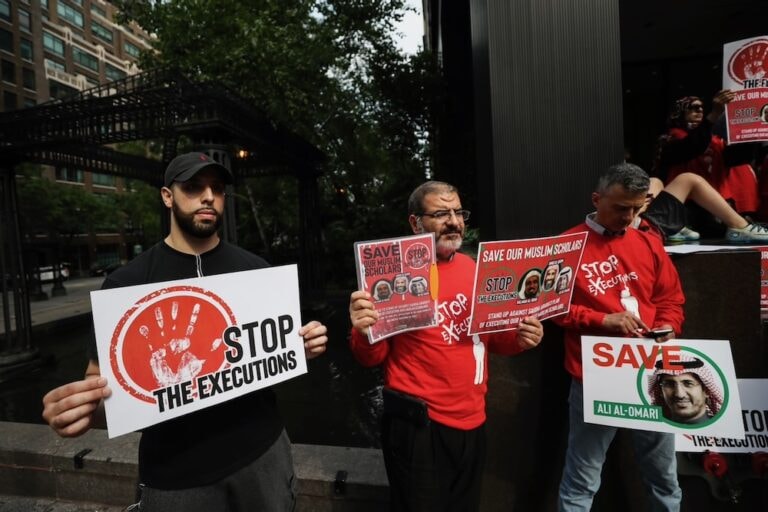In a peaceful protest seeking the release of family members held for years without charge, 19 men were detained and charged by the Saudi Bureau of Investigation and Prosecution.
(Human Rights Watch/IFEX) – 28 October 2012 – Saudi authorities should stop using the courts to prosecute and punish people for peaceful protest, Human Rights Watch said today.
On October 17, 2012, the Bureau of Investigation and Prosecution charged 19 men with “instigating chaos and sedition” and “gathering illegally” after they participated in a peaceful protest on September 23 outside Turfiya prison, in Qassim province in central Saudi Arabia. They were seeking the release of family members, some of whom have been held for years without charge. On October 18, a criminal court sentenced 15 of the men to between 3 and 15 days in prison, along with suspended sentences of between 50 and 90 lashes and suspended jail terms of between two and five months. The trial of the remaining four is scheduled for November 4.
“Instead of addressing the protesters’ concerns, the Saudi government has used the judicial system to punish them,” said Joe Stork, deputy Middle East director at Human Rights Watch. “The sentences handed to these men are part of a wider effort to target and harass activists across the country.”
Authorities have not alleged that the protesters engaged in or called for violence. Witnesses who participated in the protest told Human Rights Watch that security forces blocked off protesters’ access to food and water. Human Rights Watch examined video footage that protesters said was of the September 23 incident, which showed police beating demonstrators.
The Interior Ministry banned public protests on March 5, 2011. In a statement on October 12, the ministry warned that people should “refrain from staging rallies or taking part in any gathering or procession in violation of the law” and that those detained for doing so would be dealt with harshly.
Saudi authorities have cracked down on human rights activists for organizing peaceful demonstrations in various parts of the country, including Riyadh, the capital. In April, a Specialized Criminal Court sentenced Mohammed al-Bejadi, a co-founder of the Saudi Civil and Political Rights Association (ACPRA), to four years in prison on charges of “instigating demonstrations” and “speaking with foreign media channels.” ACPRA has attempted to register as an independent association, but without success.
The court prevented al-Bejadi from appointing a lawyer of his choice and denied observers access to his trial. Several other founders of the group, including Mohammed Fahd al-Qahtani and Abdulla al-Hamid, are on trial before a Specialized Criminal Court on charges that include “harming the reputation of the kingdom” and, in the case of al-Hamid, “inciting disorder by drafting and publishing a statement calling for protests.”
Fadhil Maki al-Manasif, a founding member of the Al Adala Center for Human Rights, is also being tried before a Specialized Criminal Court on charges of “withdrawing allegiance to the ruler” and “disrupting public order by participating in marches.” He has been in detention since October 2, 2011, when security forces arrested him after he attempted to speak with police in the Eastern province city of Qatif about the detention of two elderly people whose sons were wanted for participation in protests.
Human Rights Watch has called on Saudi Arabia to abolish the Specialized Criminal Court, which was set up in 2008 to try terrorism cases but which authorities have increasingly used to prosecute peaceful dissidents on politicized charges and in proceedings that violate the right to a fair trial. Saudi Arabia has no codified criminal law, which has had the effect that judges criminalize acts in accordance with their interpretations of Islamic law.
The lack of clear and predictable criminal law violates international human rights principles prohibiting arbitrary arrest and guaranteeing fair trials. Article 11 of the Universal Declaration of Human Rights states that, “No one shall be held guilty of any act or omission which did not constitute a penal offence, under national or international law, at the time when it was committed.” International human rights standards, including the Arab Charter on Human Rights ratified by Saudi Arabia, also uphold the right to peaceful assembly and association.
“Saudi authorities detain and punish individuals for doing nothing more than peacefully expressing legitimate grievances,” Stork said. “The Saudi government should stop using the judicial system to punish peaceful dissidents, and recognize that peaceful assembly is not a crime.”


